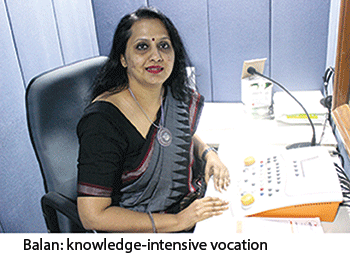With growing awareness of successful therapies administered with new age technologies to treat speech delivery and comprehension defects, SLPs are in high demand - Odeal D’souza
 Speech language pathology is an allied branch of health sciences which addresses speech and communication disorders. Speech language pathologists (SLPs) aka speech therapists, are highly trained professionals who diagnose and treat children and adults suffering speech utterance and language comprehension difficulties caused by psychological trauma, congenital defects, injury, post-surgical complications etc.
Speech language pathology is an allied branch of health sciences which addresses speech and communication disorders. Speech language pathologists (SLPs) aka speech therapists, are highly trained professionals who diagnose and treat children and adults suffering speech utterance and language comprehension difficulties caused by psychological trauma, congenital defects, injury, post-surgical complications etc.
According to a 2016 report of the Union ministry of statistics and programme implementation, an estimated 1.87 million citizens countrywide suffer speech and communication disabilities. However, with growing awareness of successful therapies employing new-age technologies to treat speech delivery defects, there is rising demand for SLPs in mainstream and special needs schools, government and private hospitals, and home healthcare service providers.
Study Programmes
To qualify as a professional speech therapist, completion of a four-year (including a compulsory 12-month internship) bachelor of audiology speech language pathology (BASLP) degree programme is mandatory. A BASLP can be followed up with postgraduate specialisations in speech-language pathology or audiology.
Among the top-ranked education institutions offering the BASLP programme are Ali Yavar Jung National Institute for the Hearing Handicapped, Mumbai; Amity University, Gurgaon; Christian Medical College, Vellore and the All India Institute of Medical Sciences, New Delhi. The minimum admission eligibility into a BASLP programme is a class XII (science) school-leaving certificate.
Higher education institutions offering postgraduate study programmes in audiology, language pathology and speech and rehabilitation include the Institute for Communicative and Cognitive Neurosciences, Palakkad; J.S.S. Institute of Speech and Hearing, Mysore; Postgraduate Institute of Medical Education and Research, Chandigarh and the universities of Mumbai, Bangalore, Chennai, and Mysore.
Shorter duration 12-month diploma courses are offered by The Care College of Physiotherapy and Paramedics, Hyderabad; CMJ University, Shillong; Integrated Institute for the Disabled, Varanasi among others. For a list of certified courses visit www.rehabcouncil.nic.in.
Pay and progression
In India, a speech therapist in a government hospital can expect a starting salary of Rs.25,000 per month which rises to Rs.40,000 after two-three years of experience. Private hospitals offer better remuneration (Rs.30,000-60,000) and perks. Moreover, postgraduates in speech pathology or audiology are readily welcomed in dysphagia and stroke rehabilitation centres and dementia clinics in the US, UK, Canada and the Gulf countries. Some SLP graduates also practice independently, and teachers with diplomas in hearing, language and speech have the option of counselling jobs in pre-primary and primary schools for special needs children.
Professional profile
“Speech and language pathology is a broad and ever changing vocation given the huge advances made in research, medicine and technology around the world. With growing awareness of innovative therapies to treat speech disorders — which were incurable a decade ago — the number of patients is continuously rising. In fact, the proportion of patients to therapists is becoming very adverse,” says Dr. Preeja Balan, co-founder and director of the Bangalore-based Octave Hearing and Speech Centre Pvt. Ltd.
An audiology and speech rehabilitation postgrad of Mumbai University of Health Sciences, Balan began her career with the Spastics Society of India in Mumbai (1998-1999) before setting up an independent practice in Chennai (1999-2003). In 2004, she signed up as faculty at the Dr. S.R. Chandrasekhar Institute of Speech and Hearing, Bangalore and concurrently began her Ph D studies at the All India Institute of Speech & Hearing, Mysore.
In 2010, together with her colleague Divya Menon and seven friends who contributed Rs.1 crore from their savings, Balan promoted Octave Hearing and Speech Centre (OHSC), Bangalore which employs 12 therapists and has recently opened a second branch in the city.
Dr. Balan advises aspiring SLPs intent on practicing independently to intern and acquire experience prior to going solo. “SLP graduates must spend quality time assisting senior therapists and medical practitioners, attend conferences on the subject and read up the latest research, before starting independent practice. This is a knowledge-intensive vocation which requires deep learning, practical experience and life skills such as communication, empathy and patience,” says Balan.